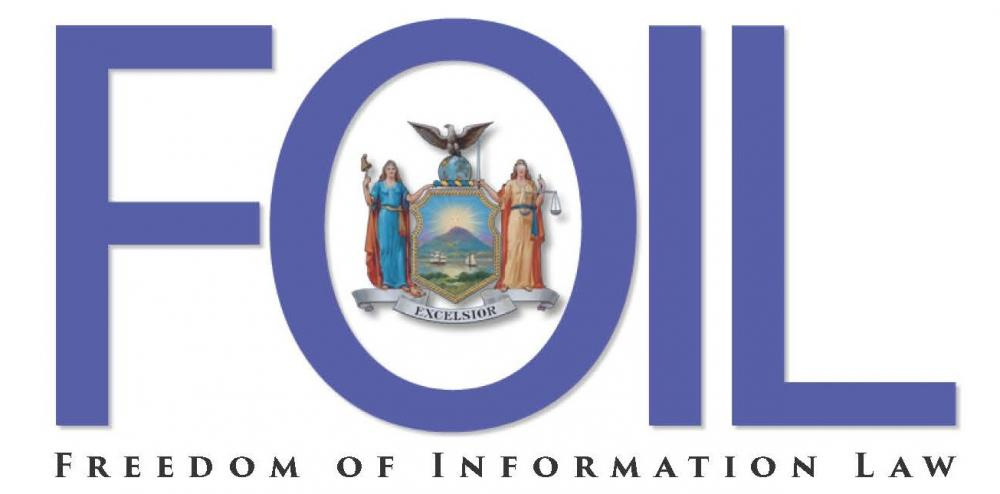Chronicle Editorial: New York’s Freedom of Information Law (FOIL) is mandatory, not discretionary. Our village and the local school district must supply the resources needed to fully honor it.
The chronic delays in fulfilling requests experienced by many members of our community defeat the legal requirements for government transparency, which are cornerstones of our democracy.
Let’s start off by accentuating the positive.
In the village of Croton-on-Hudson, the Public Access Information Officer, responsible for fulfilling the village’s obligations under the New York Freedom of Information Law (FOIL), is the Village Clerk. That position is currently held by Paula DiSanto.
In the Croton-Harmon school district, the Records Access Officer, also responsible for fulfilling FOIL obligations, is the District Clerk. That post is currently held by Denise Bisaccia.
In our experience, both Paula DiSanto and Denise Bisaccia are highly competent and professional public servants. But they both have a LOT to do besides fulfilling FOIL requests. The Croton Village Clerk, for example, is the custodian of all village records, issues all permits including dog licenses, keeps birth and death records, serves as the personnel officer, sells E-Z passes, and provides villagers with notary services, among the many other jobs listed on the village’s Website.
Now for the not so positive. Most anyone who has filed a request for public records with either the village or the school district knows that such requests are often met with delays long beyond the statutory time limits for fulfilling them. Under New York law, public records officers must acknowledge requests within five working days, and then either fulfill or deny them (or a mix of the two) within 20 business days. The law does allow for extensions of the time limit for fulfilling a request, but then:
“…the agency shall state, in writing, both the reason for the inability to grant the request within twenty business days and a date certain within a reasonable period, depending on the circumstances, when the request will be granted in whole or in part.”
The Chronicle’s experience—and that of many villagers to whom we have spoken over the past year who have filed FOIL requests with the village or school district—is that long delays in receiving records are frequent, especially, as might be expected, when the public records officers have to search through hundreds or thousands of documents to see which are potentially responsive to a request.
This is true even though, we believe, both the Village Clerk and the District Clerk have administrative staff who can and do help with the searches.
Some weeks back we celebrated the 50th anniversary of New York’s FOIL, and said a lot—as have many others—about the critical importance of both open records and open meetings laws to a functioning democracy. We pointed out that New York was one of the last states to pass its own Freedom of Information legislation, and the unfortunate fact is that this legislation, after all these years, still has flaws and gaps that allow public officials—either deliberately or by negligence—to violate its spirit and sometimes even its letter.
On the state government level, there are some departments—such as the Department of Transportation—that have become notorious for flaunting the law, forcing open government advocates to have to sue to obtain the basic rights the law was intended to protect and guarantee.
In talking to long-time Crotonites, we are often told that the village had a period of what might be called “bad old days” when the FOIL was routinely disregarded, or at the least requestors were met with fairly obvious obstacles to obtaining records they had a right to. (In those bad old days it was not unusual for a records request to simply be ignored.)
We see no reason to believe that this is still the case. Nevertheless, we have strongly disagreed with some decisions to withhold records we have asked for, even upon appeal, and we are still considering our legal options in some of these cases. We think it is fair to say that neither village nor district officials are thrilled about revealing documents that might be considered politically sensitive or prove embarrassing to some of them.
But there is an important principle here. Government officials are not doing us a favor when they give us public records that the law entitles us to. And while the law does not make a distinction between journalists and other citizens—nor should it, since freedom of information is a right shared by all—both reporters and ordinary citizens need requests to be filled in a timely manner. Whether the request is being made by a reporter on deadline or trying to keep up with an important news story, or a citizen activist seeking information important to their ongoing organizing efforts, there are often important reasons why someone would need public records sooner rather than later.
Faithful adherence to a law guaranteeing access to public records is not discretionary, but essential to democracy. It is an obligation, not an allowable choice.
The chronic delays in fulfilling FOIL requests are not the fault of our hard-working staff in either the village or the school district. They are the responsibility of higher officials who make the decisions about allocation of resources.
To this end, we urge both the village of Croton and the school district to review their FOIL procedures, identify the reasons for sometimes inordinate delays, and provide the resources necessary for their respective staff members to facilitate full compliance with the law.
We invite local residents to share their own experiences with FOIL compliance either in the Comments section below or privately with the Chronicle’s editor.
TheCrotonChronicle@gmail.com
**********************************************************************************************************
To share this post, or to share The Croton Chronicle, please click on these links.
Comments policy: No personal attacks, please be polite and respectful.






It's especially salient when people within the school district debate in FOIL-able media whether your efforts at the Croton Chronicle constitute "journalism," using that as a potential justification for not answering certain requests that you make.